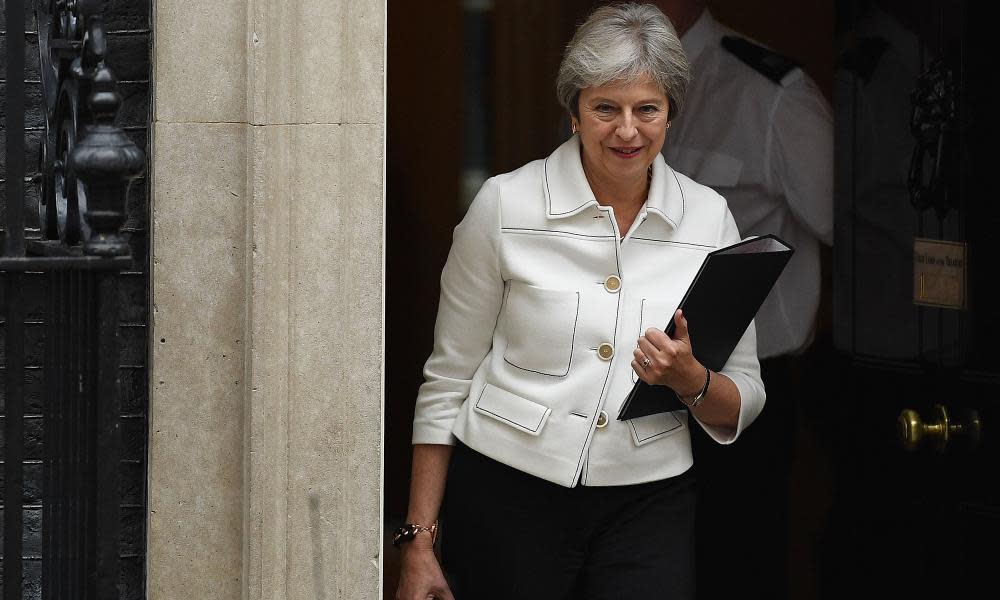Feel no pity for Theresa May – this Brexit bind is of her own making

Theresa May’s week began with an early-morning visit to a loneliness charity. She needed its help in parliament today, stymied still by intransigence on the Brexit backstop. She will need it tomorrow, with half of her cabinet toying with self-serving resignations. David Davis’s rebel cry at the weekend urged them to rise up against her and “exert their collective responsibility”, but around that table it’s every man and woman for themselves, each eyeballing the others for fear someone else might make some grandstanding demarche. This improbable crew commands our fate. Never in living memory was Britain worse governed.
Nadine Dorries’ call for Davis to be imposed as “interim” prime minister is as alarming as the thought of picking a new leader from this cabinet of knaves, fools and fantasists. Who in their right mind would think this a good moment to pause while the Tories run a leadership election? Whichever Brexiter they chose would face precisely the same set of options – and in the course of wooing their Brexit-fanatic members, the winner would pledge an even tougher stance. Expect no attack of moderation from Tory members who booed whenever the Financial Times was mentioned at their conference.
Feel no pity for May. At first she seemed plausible as the least incapable pair of hands on offer. But she threw away every chance to escape this Brexit dead-end by turning to her extreme wing. In the more than 18 excruciating months since she recklessly triggered article 50 with no plan, nothing has changed. The Brexit conundrum remains where it began, except she has made it far worse. There stands the same giant boulder in the road that is Northern Ireland’s borders. All she has contributed is mutually contradictory “red lines” that made any solution impossible. Frictionless trade, with no adjudication by the European court of justice, with no customs union, no single market and no hard border in Ireland: this was not any old cake-and-eat-it but a bankrupted Patisserie Valerie confection. And there she has stayed.
Why the surprise that no last-minute deal was fixed when Dominic Raab dashed to Brussels on Sunday night? Nothing had changed – and this man, yet another leadership contender, ideologue of the Britannia Unchained Brexit-right coterie, was certainly not the one to concede anything. Far from making new concessions in the Commons, May is still driving, foot flat down, at the Irish boulder, with no sign she means to swerve before crashing out with no deal, the “clean Brexit” called for by growing numbers of kamikaze Brexiters. Open Europe’s Simon Wolfson complains of a “superstitious reluctance” to prepare for their preferred no deal, whose costs will, he says, seem “small” in 13 years despite the IMF’s warning of “dire consequences”.
The closer we get to that Armageddon, the louder the Brextremists ramp up their Dad’s Army rhetoric. Nigel Farage, at his rallies, is “building an army to fight for Brexit”. Warning of lost sovereignty, Davis asks: “What will be our future as a free nation?” Jeremy Hunt, after comparing the EU to a Soviet gulag, claims May is “battling for Britain”. Boris Johnson writes of the “disastrous surrender of our country”. But Andrea Jenkyns MP puts it best: “It is better to go down fighting and honouring the democratic decision of our British people than be reduced to waving a white flag and surrendering to EU demands!”
Going down? Hadn’t these Captain Mainwarings better ask the people before they sink us all? Next Saturday’s march for a People’s Vote is timely as the Brexiters admit their way means “sacrifice”, not those promised pots of gold at the rainbow’s end.
Some deal may yet be cobbled together. Matt Hancock, the health secretary, hinted on Sunday that instead of a date for Britain to leave the customs union, “conditions” could be set, releasing us whenever some magico-techno solution is finally found for a no-checks Irish border. If May put almost any deal to parliament, a sigh of relief at avoiding no-deal disaster risks blinding too many Caroline Flints to what a terrible deal this would still be. We pay £39bn-50bn to leave, we stay in a customs union without a say on future rules, we are rule-takers and we accept whatever trade deals they make, such as a TTIP with the US, while losing global influence. In the cold light of day, when the shouting is done, would many citizens support terms so much worse than what we have now?
A plan B is gaining ground among the sane. Nick Boles MP proposed it, and others across the spectrum are gathering round it. Prolong the transition for, say five years, until there’s a deal. Make the whole UK temporary associate members of the EEA and EFTA, close to the single market and in the customs union, with frictionless trade with the EU and its 60 other trading countries, outside EU agriculture and fisheries. Immigration is still a stumbling block, but the EEA offers more flexibility: no freedom of movement for all, only for EU workers with jobs already. Polling suggests that’s far more acceptable. There’s no perfect solution: there usually isn’t. But a Norway Brexit as an EEA associate looks closest – and the Commons could pass it.
When May meets her fractious cabinet, she should thump the table so the water glasses jump and put to them the only plan B that stands a chance. If they refuse, then tell them only the people can break this impasse: put it to a people’s vote. Johnson’s latest mock-Churchillian advice is: “There comes a point when you have to stand up to bullies.” He meant the EU – but she needs to confront her party’s bullies. As she spoke in the Commons, AstraZeneca suspended future investment in Britain due to Brexit.
• Polly Toynbee is a Guardian columnist

 Yahoo News
Yahoo News 
